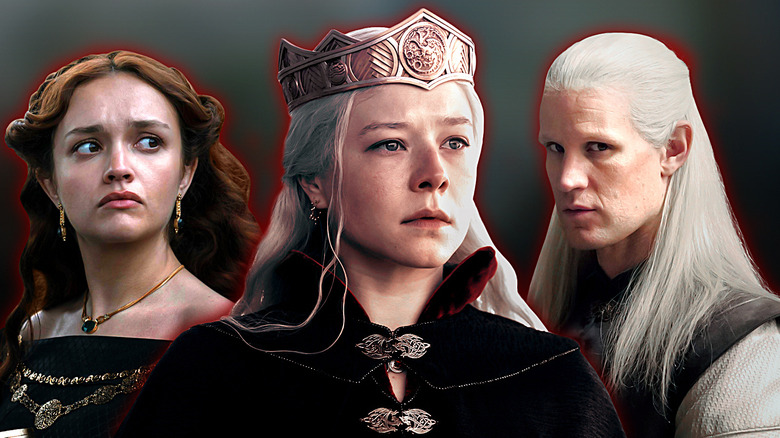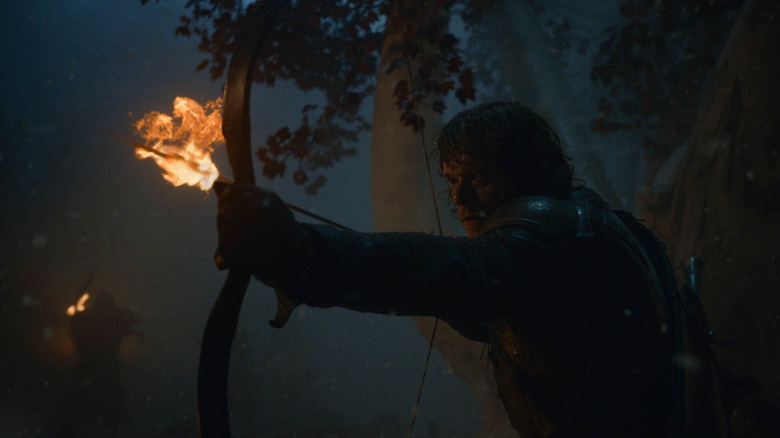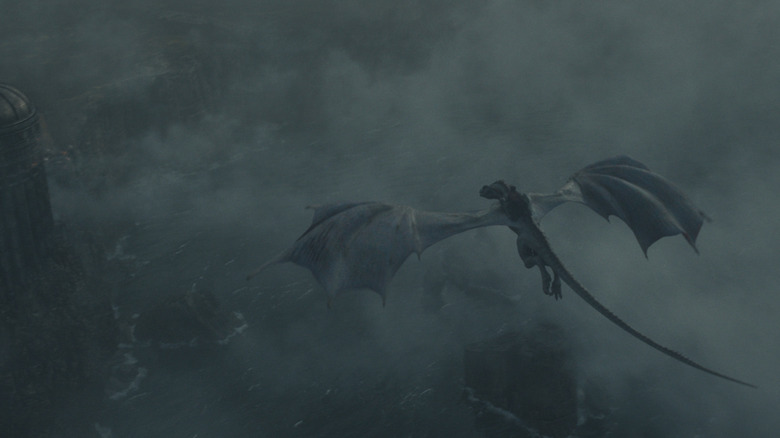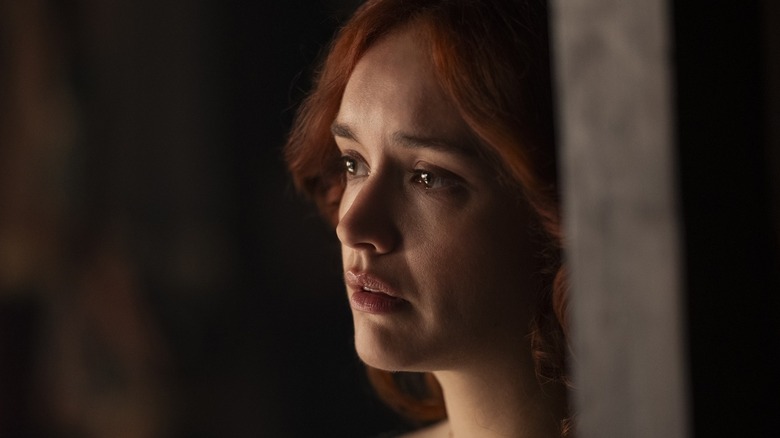House Of The Dragon Season 2 Must Change In One Big Way (Spoiler: It's Dark)
Has anyone involved with "House of the Dragon" considered maybe just ... turning the lights on from time to time?
Let's be serious for a second. Yes, "House of the Dragon" is a massive success for HBO, building on the juggernaut that was "Game of Thrones" (and earning back cultural goodwill after the disastrous ending of "Game of Thrones" back in 2019). The show's sprawling cast, which includes veteran performers like Olivia Cooke and Matt Smith alongside relative newcomers like Emma D'Arcy and Fabien Frankel, is exceptionally good, delivering grounded and real performances set within a universe where dragons are flying above their heads. The story itself — based on "A Song of Ice and Fire" author George R.R. Martin's novella "Fire & Blood" — is gripping and engaging, showing viewers the Targaryen civil war that happened roughly two centuries before the events of "Game of Thrones." This is all well and good, but in many of the show's pivotal scenes in Season 1, you can barely f***ng see anything.
This probably sounds like a petty complaint. It's likely giving "old man yells at cloud" energy, and that's to be expected. It is an incredibly frustrating experience as a viewer, though, when a major moment is shrouded in nearly complete darkness, and fiddling with your TV's brightness settings isn't for the faint of heart. "House of the Dragon" should fix this before Season 2 — and look back at "Game of Thrones" to remember exactly why poorly-lit scenes are a huge issue.
Poorly-lit action scenes has been a problem since Game of Thrones
Longtime fans of "Game of Thrones" are no stranger to poorly-lit sequences, whether they feature fighting or just a few people talking in some sort of cave or dungeon. In fact, the original series was pretty much constantly plagued by this issue. Just because a battle takes place at nighttime doesn't mean that the viewer should face the exact same visual hurdles as someone who's, say, wielding a sword in said fictional battle, and no "Game of Thrones" fan would have ever objected to a slightly brighter shot.
Take the Season 2 standout "Blackwater," which features the massive Battle of Blackwater Bay between the Lannisters and Baratheons at King's Landing. True to its name, the episode is inscrutably dark; though there are a few battle scenes aided by flaming torches, it's mighty hard to see what the hell is going on most of the time. Admittedly, "Blackwater" is far from the most egregious example of this; the series only got darker and darker as time went on (both in content and lighting, frankly). Quite infamously, the Season 8 episode "The Long Night," which devoted its entire runtime to the long-awaited Battle of Winterfell (pitting the remaining humans against the terrifyingly strong White Walkers from the North), had viewers frustrated and frantically changing their TV settings so they could have a chance of seeing what was going on. Even the moment where Arya Stark (Maisie Williams) defeats the Night King is pretty much pitch-black. This is, frankly, ridiculous; it's one of the better moments in the dreadful final season, and you can barely see it.
A major battle in House of the Dragon Season 2 takes place almost entirely in darkness
"Game of Thrones" definitely tested the patience of its enormous audience by refusing to light major scenes, but "House of the Dragon" is, frankly, just as guilty of this. If there's some sort of candle or torch shortage in Westeros during the timeframe of "House of the Dragon," nobody mentions it, but the scenes in any given castle — which is a lot of them! — are incredibly dark. Take, for example, a pivotal scene in the seventh episode "Driftmark," where a young Lucerys Velaryon (Harvey Sadler) slashes his uncle Aemond Targaryen's (Leo Ashton) eye while the young royal children fight over a dragon. It's incredibly difficult to tell which kid is which in the moment, which takes a bit of the impact out of the whole "Aemond loses an eye" thing.
Older versions of Aemond and Lucerys — played respectively by Ewan Mitchell and Elliott Grihault — also face off in a poorly-lit scene that leaves viewers confused rather than intrigued. During the Season 1 finale "The Black Queen," the uncle and nephew face off on their dragons in a scene that, tragically, leads to Lucerys' death — a death that then sets the war in motion. At the very end, Aemond's enormous dragon Vhagar takes a huge bite out of both Lucerys and his dragon Arrax, killing them both, and that part happens above the clouds (mercifully for viewers). The rest of the battle, though? It's during a thunderstorm. You try figuring out which dragon is which in those circumstances. At this point, that just feels like insult to injury.
Season 2 of House of the Dragon really needs to lighten up
In tone, "House of the Dragon" will only get darker. Lucerys' death at such a young age is a horrifying tragedy that closes out Season 1, leaving his mother Queen Rhaenyra Targaryen (Emma D'Arcy) both bereft and ready for revenge; murmurs about Season 2 indicate that an infamously brutal sequence related to two characters named Blood and Cheese will take place early in the new batch of episodes. As for the literal lighting, though? Please, please — turn up the brightness.
"House of the Dragon" is shaping up to be a good show, and potentially even a great one. Unlike "Game of Thrones," the ending is set in stone (largely because this is a story that George R.R. Martin has actually managed to finish, unlike "A Song of Ice and Fire"), which hopefully means that fans won't be slammed with yet another disappointing series finale. It's also a shorter story, and we can only hope that current showrunner Ryan Condal won't drag it out longer than necessary. This is all to say that "House of the Dragon," so far, is a worthy successor to "Game of Thrones" and could possibly even match the original show's highest points, if not surpass them. For that to happen, it would be nice if we could see what was going on. Lighten up, "House of the Dragon." We'd like to see the bloodshed, please.



